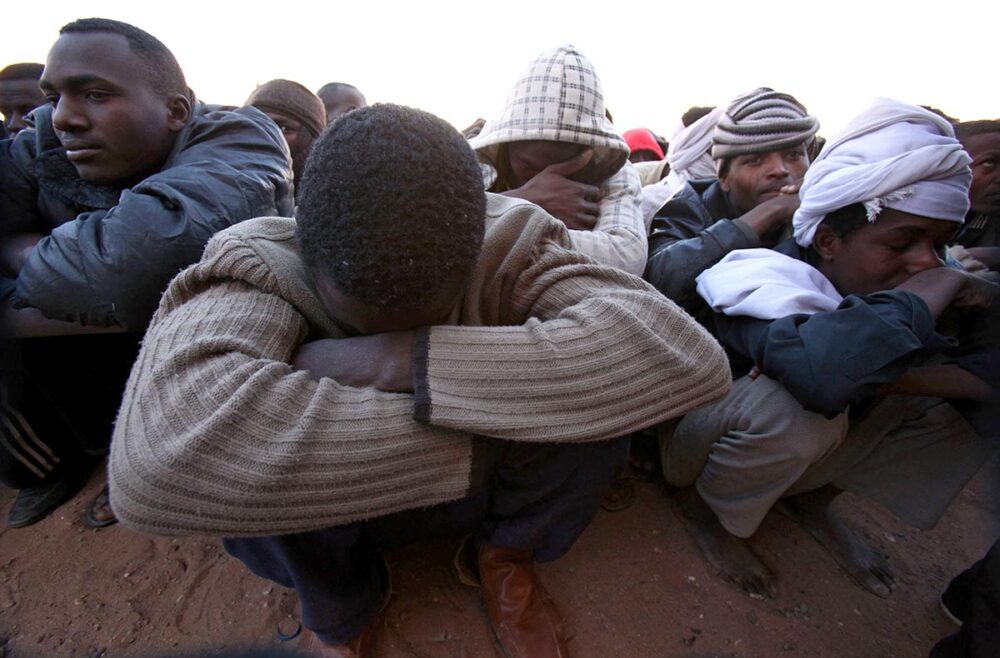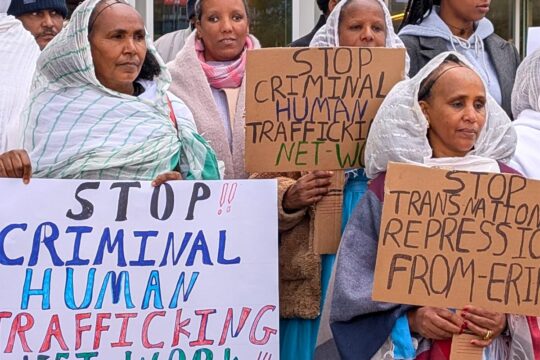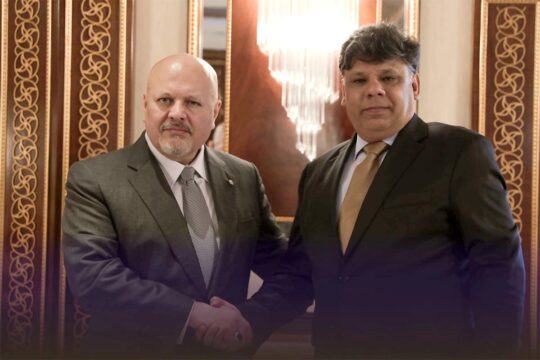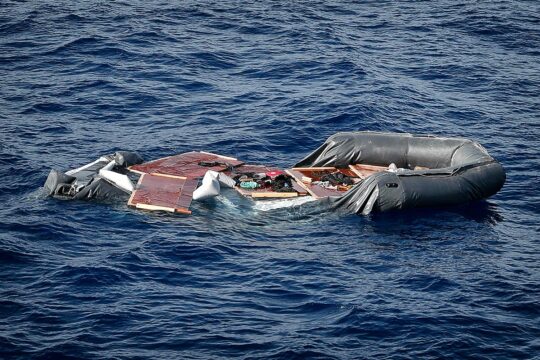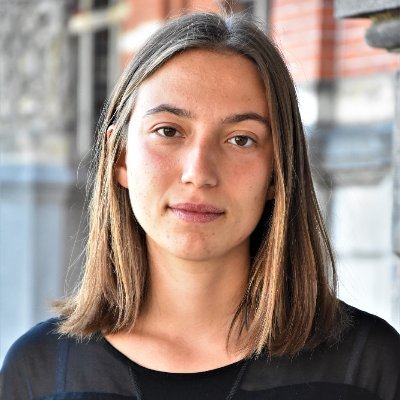“I don’t understand why I’m being prosecuted here in the Netherlands”, the accused read from a paper note at the end of the last day of hearings. On November 26, one of the largest human smuggling cases ever tried in the Netherlands concluded before the court of Zwolle, north-east of Amsterdam. Behind the dock, a 42-year-old Eritrean national, Amanuel Walid, also known as Tewelde Goitom, is accused of leading an international criminal network that detained, tortured, raped and extorted refugees in Libya and trafficked them to Europe.
“This is the first case against an alleged leader of a criminal group”, says Luigi Prosperi, assistant professor at the Utrecht University School of Law. All other European trials connected to migrant smuggling in Libya “were against small fish”, he tells Justice Info. It is also the first Dutch trial that can look at the whole migration journey, from Eritrea to Ethiopia, Libya, and Europe.
Eritreans ransomed in Netherlands
The suspect was extradited from Ethiopia in October 2022, on accusation of participating in a criminal organisation involved in human trafficking, hostage-taking, extortion and sexual violence between 2014 and 2018. The network operated detention camps, mainly Bani Walid in Libya, where people were held and tortured until families abroad paid ransoms of thousands of US dollars.
The Netherlands started to investigate the network because many Eritreans living in the country said they were extorted from Walid’s network. An investigation called ‘Pearce’ started in 2018 and included another traffickers’ leader, Kidane Zekarias Habtemariam. Kidane has been described by the Dutch police as “one of the most notorious and cruel human smugglers in the world”. Arrested in Ethiopia in 2020 together with Walid, who has been convicted on charges of human trafficking in Addis Ababa, he escaped a year later, only to be recaptured in Sudan in 2023. Kidane was convicted of financial offences in the United Arab Emirates, and he is also scheduled to be extradited to the Netherlands soon.
Seven days of livestreamed trial
The verdict in Walid’s trial is scheduled for January 27, and the judges confirmed that they will hear Kidane as a witness if he arrives before then. Like the seven days of hearings in November, the verdict will be livestreamed. This trial received wide national and international attention, according to presiding judge René Melaard who said in court that around a thousand people followed the trial online, which was streamed in Dutch, Tigrinya and English.
The trial started on November 3, with the judge reading testimonies of witnesses held in detention in Libya, smuggled to Italy and extorted money. Around 200 of them were heard by the prosecution, and 30 of them are included in the indictment. Four of the victims shared their experiences in the victims’ phase of the trial. On November 19, looking straight across the room at Walid, the Dutch public prosecutor demanded that he be convicted for the maximum sentence of 20 years. The accused must also serve, after serving his sentence in the Netherlands, the 15 remaining years of his 18-year sentence in Ethiopia. “We are dealing with criminal acts whose impact on all victims is simply beyond imagination and beyond all humanity. These offences were committed within a criminal organisation that had an impact on thousands of people”, said prosecutor Petra Hoekstra in her closing statements.
In her view, he was one of the most notorious human traffickers on the Central Mediterranean Route. “He was the linchpin of a well-oiled organisation that controlled the migrants and the associated flow of money. This was accompanied by serious human rights violations. He deprived victims of their freedom and dignity. He held them in appalling conditions, starved them, tortured them and denied them necessary medical care. He exposed them to life-threatening situations in the desert, in camps and in overcrowded old and leaky boats at sea, without food, fuel or an engine”.
“These are not events in your court’s jurisdiction”
The defence said in its closing statement on November 24 that there is not enough evidence to support the charges. “What happened in Libya and at sea is harrowing, but in the defence view, these are not events over which your court has jurisdiction”, added Walid’s lawyer Jordi L’Homme. He requested the acquittal of his client.
L’Homme disputed the maximum sentence of 20 years as “inappropriate” and said that the prosecution’s “interpretation that Walid is the kingpin of a well-oiled international smuggling network does not do justice to reality”. He referred to a UN report describing how the camps in Bani Walid “fell entirely within a Libyan dominated power structure in which armed militias and local landlords like Moussa Diab [a Libyan trafficker sanctioned by the European Union] exercised de facto control over the terrain, security and migrant flows”. The lawyer argued that “the actual power in and around the camps of Kufra, Bani Walid and Gasr Garabulli [the main Libyan camps mentioned in the case] lay in the hands of Libyan militias, landlords and guards, not smugglers from the Horn of Africa”.
Evidence of the fact that Walid was part of a criminal organisation is also lacking, according to the defence. Defence lawyer Simcha Plas said that for the Dutch criminal code, an organisation with the intent to commit crimes must have “a recognizable cooperation with certain rules, own rules, own purposes and an internal pressure to conform to that. And there’s no question of that here”. In her view, this is a “loose network of smugglers and intermediate persons that is operating within a power structure dominated by Libyans”.
“Several witness statements contain suspicions and assumptions regarding the question of what Walid’s precise role was in smuggling”, Plas said, arguing that it “cannot provide legal and convincing evidence that the client is guilty”. According to her, the accounts on extortion were contradictory, and the witnesses to smuggling “did not make the statements based on their own observations, but they say what they’ve heard. For instance, witness 89 states that within the warehouse, others said that Walid was the boss”.
Not the same person who ran the camps?
The defence repeated their position, from the opening of the trial, that their client is not the same person who ran the camps in Libya. Plas said that the accused was born and raised in Asmara, and had to start working at a young age. At 18 he joined the military service, which is mandatory and often oppressive in Eritrea. He deserted in 2014 and fled to Sudan, where he worked as a taxi driver. He later travelled to Dubai and Ethiopia and had to get a false passport because as a deserter he couldn’t obtain one from Eritrea, said Plas.
Many of the witnesses have recognised him in several pictures, the most famous one portrays Walid with a machine gun in one arm and an ammunition belt across his chest. But Plas questions the value of these recognitions: “Already since 2019, the image of my client has been used on social media in relation to human trafficking”. The lawyer said that her client “doesn’t deny being the person in the picture. But he does strongly deny being Walid”.
Jurisdiction was highly disputed by Walid’ lawyers. For smuggling, “jurisdiction can only be established if the smuggling has the Netherlands as the final destination”, argued Plas. According to the defence, the investigation showed that the final destination of the smuggling was Italy, and the royal police did not investigate the journey from there. “They didn’t focus on which was the final destination and who was in charge of further smuggling in Europe. We think it’s an irreparable gap. And this gap confirms that the public prosecution has not correctly assessed the jurisdictional issue in this case”.
L’Homme also said that the court has no jurisdiction for the crime of membership in a criminal organisation either. “The violence and sexual offences allegedly took place entirely in Libya between foreign perpetrators and foreign victims. A real concrete connection with the Netherlands is hardly conceivable”. He demanded that the “public prosecution should therefore be declared inadmissible. L’Homme concluded that his “client has gradually become the subject of a prosecution that seems primarily intended to provide a future response to a global migration problem. Dutch criminal law cannot solve that problem”.
“No extorsion without violence”
During the prosecution closing statements on November 19, Hoekstra argued that the Netherlands has jurisdiction over all the crimes, as “it’s not a prerequisite that all elements of the charges took place in the Netherlands”. She believes that the criminal conduct has enough connections to the Netherlands, as all the witnesses, besides one, arrived there and the phone numbers called for extortions were partly Dutch. “There was no smuggling without payments, and no payments without extortion, and no extortion without applying violence.”
Aside from Walid and Kidane, the investigation includes five persons based in the Netherlands and suspected of taking part in the extortions and in the money transfer through the hawala - an informal money transfer system. Their trial is set to start in April 2026.
The main camps according to the prosecution were the one in Kufra, where migrants arriving via the desert from Sudan were sold to Walid’s network, the Chicken Farm and Road 51 in Bani Walid, and the coastal one in Gasr Garabulli, where refugees were kept before they were put on boats to Italy. Videos were shown from some of these camps. Prosecutor Martijn Kappeyne van de Coppello said they did not want to “traumatise the victims again” and gave time indications for those who wanted to leave during the watch and then come back.
“The smugglers divided groups of migrants among themselves, and Walid and Kidane directed others to use violence, managed payment codes, maintained financial records and maintained order”, said Hoekstra. “A significant part of the organization operated on Dutch soil. There were agreements made about the collection, gathering and bundling of extorted sums of money, and the participants in the Netherlands ensured that the money was returned to the leaders of the criminal organisation via this underground circuit of hawala”.
“The organisation also systematically abused girls and women. For years women were taken from groups of migrants daily and forced to have sex with members of the organization”, Hoekstra told the judges. Hoekstra said Walid managed the camps, decided the ransom amount, oversaw the payments and used violence himself. The prosecution estimated that Walid was paid over 2 million dollars for the smuggling offence considered in the case.
Kappeyne van de Coppello said that even though for the law human smuggling is a crime against the state, “it’s definitely not a crime without victims. On the contrary, rather”.
Four victims in the case have claimed compensation for material and immaterial damage.
Cooperation as catalyst
The judges are now asked to decide on the facts laid out in the over 30,000 pages of the case file. For its investigation, the prosecutor collaborated closely with Italy through a joint investigation team, and it received information from the International Criminal Court (ICC). The joint team also included the United Kingdom, Spain, and Europol.
Prosperi thinks this can set a positive precedent for the ICC. “The Court finds itself in this ecosystem, where they are a justice hub. They share information and receive it from states, which say ‘we are available, we are investigating these matters’”. “These joint investigation teams are also a catalyst: when all these actors come together to work on cases, it can create a bit of competition and healthy competitiveness”, he adds.
“By choosing the right strategies, using each other’s strong points, sharing information, and collaborating as much as possible”, said Hoekstra, there will be more possibilities to tackle these criminal organisations in several EU countries, and end impunity for these violent crimes and for suspects in Libya or Sudan who “act as if they are untouchable”.
A correction was made on January 30, 2026. It was mistakenly written that Walid was paid « almost 3 million dollars » when the disclosed figure was in fact « over 2 million ». Our apologies.


